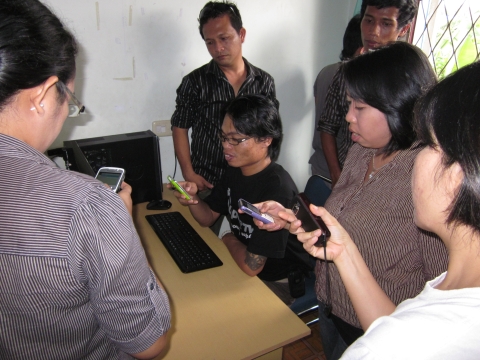
These villagers in Indonesia are citizen-journalists-in-training, learning to send short news items through their mobile phones.
Juliatus, who only finished junior high school, has been a worker at an oil palm plantation near the village. Without realizing it, he spoke for others in the workshop, which was held in sei Enau. The same thought was repeated by Adrianus Akid, Abet Nego, Herculanus Herman and nine other participants.
With the addition of these recent trainees, there are now 106 citizen journalists, or CJs, who have been trained to write short news items -- just one-to-four sentences in length -- and send them by text to RuaiSMS. Using their cell phones and the Frontline SMS program, the CJs can now report the news most important to them and their communities through a service that reaches mainstream news. The CJs’ stories will be distributed to RuaiSMS subscribers through their cell phones and will appear on RuaiTV as news tickers, as well as on the RuaiTV website, which has just launched.
Citizen journalism can be incredibly simple and remarkably powerful at the same time. Like Juliatus, most of these trainees have no formal education in journalism. But they are eager to address the challenges that face their rural communities. In the first session, they explored their experiences and perceptions when they reviewed stories in mainstream media by reading newspapers or magazines, or watching television programs.
In the beginning, they shared a perception that mainstream media always provided important information for them. After they thought more critically, they realized that mainstream media almost never covered issues in remote areas including their villages, that most mainstream media were not independent anymore and that some mainstream media have their own agendas.
They were startled to realize that most of the important information about indigenous people never made it into the newspapers, radio or television. As they began to understand basic journalism, especially the importance of journalists reporting only facts, they developed a critical way of thinking when they consume media in the future. They can now analyze the news and are able to separate facts from opinions or assumptions of journalists.
In just two days of training, they received basic knowledge and skills most journalism students would easily recognize, including how to write a report in one-to-four sentences; writing stories using the inverted pyramid news structure; separating opinion, facts and truth; and understanding the student journalist code -- 5W+1H -- for Who, What, When, Where, Why and How.
It takes more than two days to turn a citizen into a citizen journalist, but by arming these participants with the basic skills of the trade, we offer them a voice they've not had before.
Editor's note: Harry Surjadi is a Knight International Journalism Fellow who is launching a mobile environmental news service for rural Indonesians. He recently held a workshop to train citizen journalists on how to report on important issues.